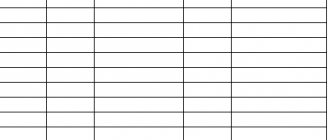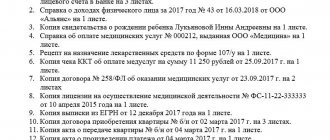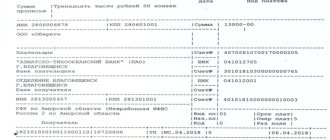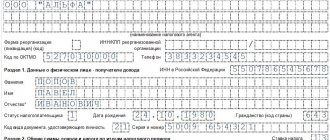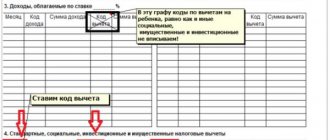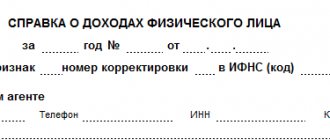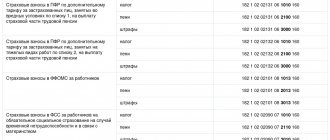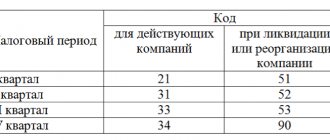New income codes in certificate 2-NDFL in 2021
In accordance with paragraph 1 of Article 230 of the Tax Code of the Russian Federation, both the codes of income and income tax deductions must be indicated in the 2-NDFL certificate. In order to indicate codes in a document, tax agents need to rely on Order of the Federal Tax Service of the Russian Federation No. ММВ-7-11/387 dated September 10, 2015, which contains all the necessary information:
- in Appendix No. 1 - codes of types of income;
- in Appendix No. 2 - codes of types of deductions;
Employees of the Federal Tax Service from time to time supplement the existing list of codes for types of income and deductions with new codes, making appropriate amendments.
By Order of the Federal Tax Service No. ММВ-7-11/ [email protected] dated November 22, 2021, some adjustments were made to the codes, as a result of which the following codes were added:
- 2002 – for bonuses included in wages;
- 2003 – for non-labor bonuses from profits (target funds).
Federal Tax Service Order No. ММВ-7-11/820 dated October 24, 2021 (the document was published on December 21, 2017) introduced new adjustments to the income codes that should be reflected in the 2-NDFL certificate. And despite the fact that the amendments came into force on January 1, 2018, when issuing a certificate for 2021, you must take into account all new income codes.
Responsibility
When filling out 2-NDFL in 2021, it is necessary to check for errors even when the data is entered in the program. Particular attention should be paid to the codes and to clarify whether any other types of profit have been removed from the “Other income” category. For providing incorrect information, there is a fine of 500 rubles for each sheet containing errors.
The income codes in the personal income tax certificate are an important part of it, so it is worth checking their relevance annually, as they are constantly changing and being updated. This will help not only keep your reporting in order and provide employees with only truthful information, but also avoid problems with the tax service.
Table of new income codes from 2021
Until 2021, all personal income tax codes listed in the table corresponded to one code - 4800 “Other income”.
| Decoding | Code |
| Compensation for unused vacation | 2013 |
| Severance pay in the form of average monthly earnings for the period of employment, compensation to the manager, deputy managers and chief accountant of the organization in the amount exceeding in general three times the average salary (or six times for organizations in the Far North) | 2014 |
| Fines and penalties paid by an organization on the basis of a court decision for failure to voluntarily satisfy consumer requirements in accordance with the law on the protection of consumer rights | 2301 |
| The amount of bad debt written off in accordance with the established procedure from the organization’s balance sheet | 2611 |
| The amount of income in the form of interest (coupon) on circulating bonds of Russian organizations denominated in rubles | 3021 |
What else is taken into account by code 4800
This code is used to take into account other income for which a personal code has not been established.
These include:
- Daily expenses for a business traveler, executed under a work contract or employment contract, paid in excess of the approved limit;
- additional payments at the expense of the enterprise’s own funds, which are made for sick leave and maternity benefits. It is important to remember that maternity benefits are not subject to personal income tax, as well as amounts paid to care for a child under the age of one and a half years; they are not shown in the declaration.
Therefore, before sending reports to the funds, you need to carefully review the amounts falling under code 4800; the tax office checks them first.
What income code is used in 2nd personal income tax when renting a car?
How to submit 2-NDFL for 2021?
The deadline for submitting the 2-NDFL certificate for 2021 is April 2, 2019. It is worth taking into account that the document, which is filled out for each employee separately, must be provided on a new form of the 2021 sample, taking into account all new personal income tax codes. The old certificate form will not be accepted by the Federal Tax Service employees.
The new form of certificate 2-NDFL for 2021 was approved by Order of the Tax Service dated October 2, 2018 No. ММВ-7-11/566. Two different forms of 2-NDFL have been approved for issuance to the employee and for submission to the tax authority.
The current Form 2-NDFL for 2021 can be found here:
Form 2-NDFL 2021 for submission to the Federal Tax Service:
Form 2-NDFL 2021 for issue to the employee:
Changes in form 2-NDFL 2021
At the end of the publication, it should be noted exactly what changes were made to the 2-NDFL certificate form in 2021:
1. New fields are introduced in section 1 of the document:
- “Form of reorganization (liquidation)” (you must specify a code from “0” to “6”);
- “TIN/KPP of the reorganized organization.”
2. The legal successor of the tax agent must indicate OKTMO at the location of the reorganized organization (its separate division).
3. The legal successor of the reorganized organization, which submits 2-NDFL, must reflect the name of the reorganized organization (its separate division) in the “Tax Agent” field.
4. The fields that are reserved for indicating the address are excluded from section 2 “Data about the individual - recipient of the income.”
5. Investment deductions are excluded from tax deductions in section 4 of the certificate.
Why do you need a personal income tax certificate?
A declaration filled out in form 2-NDFL is a report on employees submitted to the tax office annually by both legal entities and individual entrepreneurs in any taxation system. The filing deadline is March 1 of the year following the reporting year, but most often this date can be extended until April 1.
2 personal income tax contains the following sections:
- Information about the organization - name, details.
- Information about the employee - the new form eliminates the need for a registered address.
- Information about his income, which is subject to a rate of 13%.
- Tax deductions – property, social and others.
- Total amounts – income, deductions, taxes withheld.
Therefore, most often it is necessary for:
- Calculation of pensions.
- Visa processing.
- Litigation.
- Registration of child adoption.
- Calculation of alimony.
- Obtaining a loan for a large amount, including a mortgage.
- Benefit calculations when a family finds itself with low income.
In the accounting department, any employee can issue a personal income tax certificate; no statements or explanations of the reason are required. It is also recommended to take it when leaving your job in case of completing any documents - sometimes certificates from all places of work for the year are required for deduction. 2 personal income taxes are issued within no more than 3 days.
A declaration on this form will also help the accounting department consolidate data for all employees at the end of the reporting period.
What premiums should insurance premiums be calculated for?
Article 420 of the Tax Code of the Russian Federation recognizes as the object of taxation of insurance premiums for organizations payments and other remuneration that are made within the framework of labor relations in favor of employees. This means that the key point when deciding whether to include bonus amounts in the base for calculating contributions is the connection of these payments with the employee’s performance of work duties, as well as whether these payments have an incentive nature (rulings of the Supreme Court of the Russian Federation dated January 26, 2018 No. 307-KG17-21301 and dated 12/27/17 No. 310-KG17-19622, see “Holiday Bonuses: The Supreme Court clarified when such payments are not subject to contributions”).
Taking into account these criteria, production bonuses (both periodic and one-time; both bonuses that are part of the salary and incentive bonuses) should be subject to insurance premiums on a general basis. As for non-production premiums, there is no need to charge insurance premiums for them. This conclusion is confirmed by the rulings of the Supreme Court of the Russian Federation dated 09/01/15 No. 304-KG15-10018 (see “Supreme Court: employee anniversary bonuses are not subject to insurance contributions”) and dated 01/16/18 No. 303-KG17-20493 (see “Contributions for payment upon retirement of an employee: the position of the Supreme Court"), by resolution of the Arbitration Court of the Volga District dated September 27, 2016 No. F06-13612/2016). Let us note that for now the Ministry of Finance of Russia does not agree with this interpretation of the provisions of Article 420 of the Tax Code of the Russian Federation, and insists on the payment of insurance premiums on non-production premiums (letter dated 02/07/17 No. 03-15-05/6368, see “Ministry of Finance: bonuses to employees for holidays and anniversaries are subject to insurance premiums").
Fill out, check and submit insurance premium calculations online
Codes of income that are subject to personal income tax when the limit is exceeded
Income code 2720 – cash gifts to the employee. If the amount exceeds 4,000 rubles, then tax is charged on the excess. In the certificate, the amount of the gift is shown with income code 2720 and at the same time with deduction code 501 .
Income code 2760 – financial assistance to an employee or former employee who retired due to disability or age. If the amount of assistance exceeds 4,000 rubles, then a tax is levied on the excess. In the certificate, the amount of financial assistance is shown with the income code 2760 and at the same time the deduction code 503 .
Income code 2762 – one-time payment in connection with the birth or adoption of a child. If the amount exceeds 50,000 for each child, but for both parents, then tax is charged on the excess amount. In the certificate, this amount is shown with income code 2762 and deduction code 504 .
Under what conditions is a premium recognized as an expense?
As is known, labor costs include any accruals to employees in cash and (or) in kind, incentive accruals provided for by legislation, labor and (or) collective agreements (Article 255 of the Tax Code of the Russian Federation). At the same time, paragraph 2 of Article 255 of the Tax Code of the Russian Federation directly states that labor costs include accruals of an incentive nature, including bonuses for production results. Bonuses are included in labor costs if the following conditions are simultaneously met:
- the bonus is provided for by an employment agreement (contract) and (or) a collective agreement, or a local regulatory act (regulations on remuneration, regulations on bonuses for employees), provided that the employment contracts contain a reference to this act (Article 255, paragraph 21 of Art. 270 Tax Code of the Russian Federation). The corresponding clarifications are given in letters of the Ministry of Finance of Russia dated 02/12/16 No. 03-03-06/3/7522 and dated 06/03/14 No. 03-03-06/4/26582 (see “The Ministry of Finance recalled under what conditions remuneration paid to employees at the end of the year, may reduce taxable profit” and “The Ministry of Finance announced when the cost of bonuses for holidays can be taken into account when calculating income tax”). At the same time, it is important that the document establishes specific indicators taken into account when assigning a bonus, the procedure for determining the bonus, the conditions for paying the bonus, etc. This is stated in the letter of the Federal Tax Service of Russia dated 04/01/11 No. KE-4-3/5165 (see “The Federal Tax Service recognized bonuses, the amount of which was provided only in the bonus order, as a labor expense”).
Compose HR documents using ready-made templates for free
- a bonus (regardless of its name) is paid for labor performance, that is, for production results, professional excellence, high achievements in work, etc. (Clause 2 of Article 255 of the Tax Code of the Russian Federation, letter of the Ministry of Finance of Russia dated July 22, 2016 No. 03-03-06/1/42954, see “Non-production bonuses do not reduce taxable profit”). It does not matter whether such a bonus is periodic or one-time, whether it is in the nature of wages or is an incentive not included in the salary. This means that as part of expenses, you can take into account both a one-time bonus for special achievements in work or for performing certain work, and a bonus for vacation, if these payments are correctly established in the relevant local acts and employment contracts;
- there is a document confirming that the employee fulfills the bonus conditions established by the organization (memo, justification calculation, etc.). If the bonus is paid based on the results of work in each month, then it should be obvious that in each month the employee fulfills the production indicators for which it is awarded: actual time worked, the amount of material assets created, the amount of income received through labor, etc. (letter of the Federal Tax Service of Russia dated 04/01/11 No. KE-4-3/5165, see “The Federal Tax Service recognized bonuses, the amount of which was provided only in the bonus order, as a labor expense”).
- there is an order to pay the bonus (clause 1 of Article 252 of the Tax Code of the Russian Federation).
All of the above is relevant both for those taxpayers who are on the OSNO and for those who pay a single tax under the simplified tax system. After all, the “simplified people” who have chosen the object of taxation “income minus expenses” take into account labor costs according to the rules of Article 255 of the Tax Code of the Russian Federation (subclause 6 of clause 1 of Article 346.16 and clause 2 of Article 346.16 of the Tax Code of the Russian Federation).
Keep records, prepare and submit income tax and VAT reports
As for non-production bonuses (in connection with retirement, for a birthday or anniversary, for a holiday, including professional ones), they are not taken into account when taxing profits on the basis of paragraph 21 of Article 270 of the Tax Code of the Russian Federation. This conclusion is confirmed in letters from the Ministry of Finance of Russia (for example, dated 04.24.13 No. 03-03-06/1/14283, dated 03.20.13 No. 03-04-06/8592, see “The Ministry of Finance clarified the procedure for taxation of one-time benefits when employees leave for retirement” and dated 02.21.11 No. 03-03-06/1/111, see “A one-time payment upon retirement of any employee is not taken into account in expenses”). A similar approach is followed by courts of various instances (see, for example, Resolution of the Presidium of the Supreme Arbitration Court of the Russian Federation dated 03/01/11 No. 13018/10, Resolution of the Federal Antimonopoly Service of the West Siberian District dated 03/05/13 No. A81-1945/2012, East Siberian District dated 05/02. 12 No. A74-2038/2011, Northwestern District dated 09.07.09 No. A56-20637/2008 and Volga District dated 10.17.06 No. A65-3412/2006-SA2-41, resolution of the Arbitration Court of the North Caucasus District dated 15.04. 15 No. Ф08-894/2015).
Note that the ban on writing off non-production bonuses also applies to “simplified” workers, since, by virtue of the direct indication of paragraph 2 of Article 346.16 of the Tax Code of the Russian Federation, such taxpayers, when accounting for expenses, act according to the rules of paragraph 1 of Article 252 of the Tax Code of the Russian Federation. And this norm, in turn, does not allow taking into account the expenses specified in Article 270 of the Tax Code of the Russian Federation.
Keep records, prepare and submit reports according to the simplified tax system in the web service
Income code for personal income tax in 2018 when receiving compensation for dismissal
Personal income tax on severance pay upon dismissal Current legislation allows us to identify situations for paying severance pay:
- According to Article 84 of the Labor Code of Russia, payment is made upon termination of an employment contract due to a violation of the rules of conclusion. This is done if the misconduct is not on the part of the employee, but the continuation of the performance of labor functions is impossible;
- according to Article 178 of the Labor Code of Russia, it is possible to receive a payment if the company is liquidating or reducing its staff position;
- according to Part 3 of a similar legal act, termination of an employment contract is possible in connection with the conscription of employees into the Armed Forces;
- according to paragraph 5 of a similar legal act, it is possible to receive payments due to the employee’s refusal to be transferred to another location to perform work duties.
The list of all circumstances is not closed.
Obligation of the employer to issue documents to the employee
Issuing a certificate upon dismissal is not the right, but the obligation of the employer without reminders from the individual. persons about this need. If the certificate is not issued on time, this is done after the employee applies in a short time.
This norm is enshrined in Article 62 of the Labor Code. Upon dismissal of an individual The employer provides a certificate only upon oral request from the employee, who clarifies for what period he needs the calculation.
However, if it is provided on time, it is better to support the request with an application for extradition.
The company acts as a tax agent who makes monthly payments to individuals. persons - employees of the organization for the payment of earnings, in addition, accrue, withhold and transfer personal income tax to the treasury.
In practice, situations are not uncommon when, upon dismissal, the 2nd personal income tax report from the last place is not issued on time due to the formation of a debt to the employee, as well as when errors are discovered in the company’s accounting.
After a written application from the employee, the 2nd personal income tax report is issued no later than three days, only if, if this deadline is violated, the individual. the person will contact the labor inspectorate.
The number of report copies is not regulated. If necessary, after dismissal, the employee makes a written request to the head of the company to issue several forms, and he does not have the right to refuse.
They don’t give you a 2NDFL certificate
Therefore, such certificates must be provided by the tax agent each time relevant requests are received from individual taxpayers (including employees and former employees) no later than three working days from the date of filing the relevant application (Article 62 of the Labor Code of the Russian Federation).
As for the date of the certificate, in accordance with Section II “Filling out the Certificate form” of the Recommendations for filling out the 2-NDFL form, in the “from” field the date (date, month number, year) of the Certificate was compiled by sequentially recording data in Arabic numerals, for example: 15.01 .2014, where 15 is the day, 01 is the month, 2014 is the year.
For your information: At the same time, paragraph 2 of Art.
Rules for document execution
The type of declaration was approved on October 30, 2021. The mandatory requirements when filling out 2nd personal income tax include completing the following fields:
- Information about the employer, details. Reductions are allowed only in accordance with the statutory acts;
- information about the recipient of the profit - individual. face;
- profit subject to taxation;
- deductions that were applied in the reporting period;
- the amount of profit and personal income tax.
In the information field about the agent, you must indicate complete information about the legal entity.
In the information column about physical the person is told the following:
- Last name, first name, patronymic;
- citizenship and status as a taxpayer;
- place of registration and place of residence;
- passport details.
Profit on which personal income tax is withheld is reflected by month. At the same time, indicate the code of income and tax deductions indicating the amounts. If physical the person had the right to other deductions - social or property, this information is reflected in certificate 2 and indicates that such a right was presented.
The form must be certified by the manager or other authorized person and stamped. The certificate is considered invalid without a stamp.
In relation to the calculation of 2nd personal income tax, the registration procedure applies: corrections are not allowed, if errors are detected, a new form is issued as soon as possible.
For misrepresentation of information or delay in time, administrative sanctions are applied to the tax agent.
Personal income tax: we determine the date of actual receipt of bonuses
Regarding personal income tax, the main problem is determining the date of actual receipt of income in the form of bonuses for production results. (Note that with non-production bonuses such a problem practically does not arise, since these incentives definitely do not relate to wages, which means that the provisions of paragraph 2 of Article 223 of the Tax Code of the Russian Federation are not applicable to them).
The date of actual receipt of income is important for several reasons. Thus, both personal income tax reporting forms are “tied” to it (calculation 6-NDFL and certificate 2-NDFL), incorrect completion of which threatens the tax agent with a fine of 500 rubles for each such document (clause 1 of Article 126.1 of the Tax Code of the Russian Federation).
Fill out and submit 6‑NDFL and 2‑NDFL via the Internet
In addition, the date of actual receipt of income is important when deciding on the provision of “children’s” deductions. If, as a result of an accountant’s mistake, an employee is accrued an excessive amount of deductions, then for the company this may result in a more significant fine in the amount of 20% of untimely withheld personal income tax amounts (Article 123 of the Tax Code of the Russian Federation).
Let us remind you that the right to a “children’s” deduction is retained by the employee only until his income from the beginning of the year exceeds 350,000 rubles (subclause 4, clause 1, article 218 of the Tax Code of the Russian Federation). And according to paragraph 3 of Article 226 of the Tax Code of the Russian Federation, the calculation of personal income tax amounts is carried out by tax agents on the date of actual receipt of income, determined in accordance with Article 223 of the Tax Code of the Russian Federation. The inclusion of income in the tax base for the purposes of calculating the amount of personal income tax is also carried out taking into account the provisions of Article 223 of the Tax Code of the Russian Federation (clause 3 of Article 225 of the Tax Code of the Russian Federation). This means that the amount of income for the purposes of applying the provisions of subparagraph 4 of paragraph 1 of Article 218 of the Tax Code of the Russian Federation should also be determined on the basis of Article 223 of the Tax Code of the Russian Federation.
Calculate your salary and personal income tax with standard deductions for free in the web service
So, let's look at the rules for determining the date of actual receipt of bonus payments. Let us note that recently the regulatory authorities have apparently managed to come to some kind of consensus on this issue. The rules are as follows.
- Non-production bonuses for the purposes of calculating personal income tax are considered to be actually received on the day of payment (transfer) of funds. That is, these payments are subject to the rules of subparagraph 1 of paragraph 1 of Article 223 of the Tax Code of the Russian Federation.
- The same rule of subclause 1 of clause 1 of Article 223 of the Tax Code of the Russian Federation applies to production bonuses (both bonuses that are part of the salary and incentive bonuses), which are paid for production results determined over a period of time exceeding one month (i.e. for a quarter, half a year, year, etc.). In these cases, the date of actual receipt of income will be considered the day of payment (transfer) of the relevant funds. This conclusion is contained in letters from the Ministry of Finance of Russia dated October 23, 2017 No. 03-04-06/69115 and dated September 29, 2017 No. 03-04-07/63400 (see “The Ministry of Finance spoke on how to determine the date of receipt of income in the form of an annual bonus "). A similar approach is followed by the Federal Tax Service of Russia (letters dated October 6, 2017 No. GD-4-11/20217 and dated October 26, 2017 No. GD-4-11/217685, see “Annual bonus in 6-NDFL: tax authorities reminded how to determine date of actual receipt of income").
- As for monthly production bonuses (both bonuses that are part of the salary and incentive bonuses), a different principle applies to these payments: they, like salaries, are considered received on the last day of the corresponding month. Such clarifications are given in the letter of the Ministry of Finance of Russia dated 04.04.17 No. 03-04-07/19708 (see “The Ministry of Finance announced which day is recognized as the date of receipt of income in the form of a bonus for the purpose of paying personal income tax”) and the letter of the Federal Tax Service of Russia dated 14.09.17 No. BS-4-11/18391 (see “Explained how to fill out 6-NDFL if the bonus based on monthly performance is paid in the next reporting period”).
Based on these rules, it turns out that an accrued but unpaid monthly bonus increases the taxpayer’s income in the month based on the results of work in which the accrual occurred, and in the same month should be reflected in the 2-NDFL certificate and section 1 of the 6-NDFL calculation. This means that if, taking into account such a bonus, an employee’s income from the beginning of the year exceeds 350,000 rubles, then for the current month he is no longer entitled to a “children’s” deduction. Moreover, even if the bonus is actually paid later.
But all other bonuses (production bonuses based on work results for periods exceeding one month, as well as non-production bonuses) increase the employee’s income and are reflected in personal income tax reporting only in the month of actual payment of money. This means that, for example, an employee with a salary of 65,000 rubles, to whom an annual bonus in the amount of 250,000 rubles was accrued in February, but will actually be paid only in June, will be able to receive “children’s” deductions until May.
